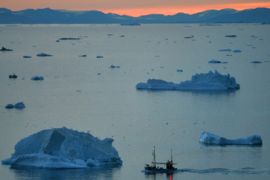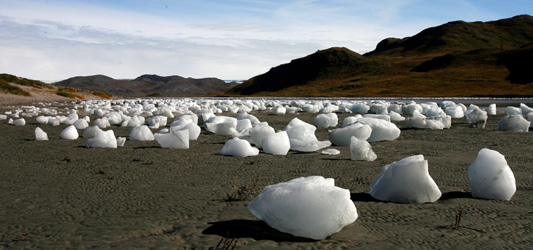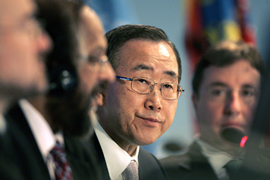Stark new warning on climate change
UN panel finds global warming’s impact accelerating and potentially irreversible.

 |
IPCC report says the evidence of a human role in global warming is now ‘unequivocal’ |
The world’s top scientific authority on climate change says the already visible impact of global warming will accelerate and is potentially irreversible.
Heat waves, rainstorms, tropical cyclones and surges in sea levels are among the events expected to become more frequent, more widespread and more intense according to new document to be published by the UN’s Intergovernmental Panel on Climate Change (IPCC).
The report to be released on Saturday at the end of the group’s meeting in the Spanish city of Valencia and is the first overview on the greenhouse-gas effect since 2001.
Keep reading
list of 4 itemsWorld’s coral reefs face global bleaching crisis
Why is Germany maintaining economic ties with China?
Australia’s Great Barrier Reef suffers worst bleaching on record
The IPCC report says the evidence of a human role in observed warming is now “unequivocal”.
Urgent action
Ban Ki-moon, the UN chief, has called for urgent action on the issue.
“I believe we are on the verge of a catastrophe if we do not act. I am not scare-mongering. But I believe we are nearing a tipping point,” he is as quoted as saying in the International Herald Tribune newspaper.
Launching the IPCC report, Ban said that next month’s climate change conference in Bali, Indonesia, was an opportunity for policymakers to make real decisions on the environment.
“Today, the world’s scientists have spoken, clearly and with one voice. In Bali, I expect the world’s policy makers to do the same. Together we can do even more and address climate change. We can transform a necessity into a virtue,” he said.
 |
| Ban listens to Pachauri at the IPCC report release [AFP] |
Rajendra Pachauri, chairman of the UN panel on climate change, told Al Jazeera: “I think that if the leaders of the world don’t do anything about climate change, the impact could be really serious. And some of them may result in abrupt and irreversible changes.
“You could have areas of the world facing serious catastrophe.
“I think leaders should understand that the cost of addressing climate change is not burdensome at all. It’s something that all countries of the world can take part in.
“Towards technologies, production and consumption methods, by which we reduce our carbon footprint on this Earth.
“That requires to be understood with a sense of urgency. There is a very short window of opportunity and that means we need to move very fast.”
Drastic action
But Bjorn Lomborg, author of The Sceptical Environmentalist, said that while climate change is happening and man is causing it, it is “somewhat silly” to think that man can drastically change his ways right now.
“See how much time it took anyone to do anything about the Kyoto protocol,” he said.
“It took 10 years and yet the outcome is very very tiny.
“Even if it had been everything that everybody had promised, it still would have only postponed global warming, by the end of the century, by seven days at a cost of $180 bn a year.”
“That’s where I think we need to realise we need smarter solutions, and that will have to be longer term solutions on investment in research and development on non-carbon emitting energy technologies.”
The IPCC report outlines a scientific consensus on human-induced climate change and indicates that so-called climate sceptics who doubt such findings are now firmly a minority.
Guide for politicians
The 20-page report, labelled a “summary for policymakers”, is designed to be a guide for politicians facing decisions on cutting pollution from fossil fuels, moving to cleaner energy sources and strengthening defences against drought, flood, storms and other problems that are predicted to increase because of climate change.
The IPCC forecast that, by the year 2100, average global temperatures could rise between 1.1C and 6.4C while sea levels will rise by between 18cm and 59cm.
The report says all countries will be affected, but poorer nations, which it says are the least to blame, are likely to be the hardest hit.
Those poorer countries, whose economies often depend on heavily industrialised technologies, the issue of compromise on climate change can have a devastating financial impact.
Assistance required
When asked how they would likely be compensated, Pachauri said that assistance must be provided by the developed world, but gave little information on how this can be done.
Developments such as retreating glaciers and declining amounts of snow in alpine regions, thinning Arctic sea ice during the summer show that climate change is already on the march, it says.
The UN Framework Convention on Climate Change (UNFCCC) conference due to be begin on December 3 is to set a “roadmap” of negotiations for intensifying cuts in carbon emissions beyond 2012, when the Kyoto Protocol runs out.
The details of the 20-page summary report supported by a 70-page technical document was outlined by negotiators from more than 140 countries over five days.